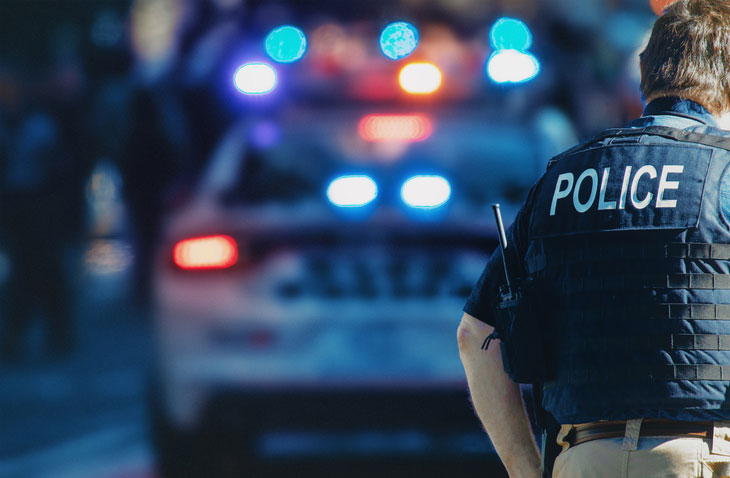
The appearance of U.S. Department of Defense (DoD) visual information does not imply or constitute DoD endorsement.
Many veterans from every branch of the service and all kinds of different specialties gravitate to civilian careers in law enforcement. It’s a natural fit. Police agencies are paramilitary organizations, with similar chain of command, regulations, and skills used in their daily duties.
Even more important are those duties themselves. Just like military service, policing is a job that exists to protect and defend the citizens of the United States. If you have the personality to be drawn to military service, there’s a good chance you have what it takes to be a cop.
The best way to turn military service into a stable, long-term law enforcement career in the civilian world is by specializing as a military police officer and earning a college degree in criminal justice or a related field.
Military police officers have some special roles and responsibilities in time of war, but most of the time, they handle many of the same tasks as any other police officer. And although they have slightly different rules to follow with respect to rights and investigative guard rails, they get the same kind of training and similar instruction to civilian police.
That by itself is enough to land you an entry-level position in many civilian police agencies. But add a college degree to the mix and you suddenly have the potential to go further your law enforcement career.
Explore Your Military Training and Degree Options
How Military Law Enforcement and Legal Training Overlaps With Civilian Policing
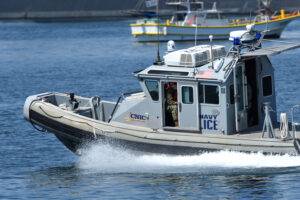 Most people realize that military life is a little more rules-based than day-to-day civilian life. But they might not realize that there is an entirely parallel legal system in place where those rules come from.
Most people realize that military life is a little more rules-based than day-to-day civilian life. But they might not realize that there is an entirely parallel legal system in place where those rules come from.
Every member of the American military is governed by a slightly different set of laws and regulations than civilians. The Uniform Code of Military Justice, or UCMJ, offers a strict set of codes for everything from malingering to misbehavior before the enemy. It’s a much more restrictive collection of rules than anything in the civilian world.
The military police are responsible for enforcing the UCMJ and protecting lives and property on military bases around the world. In most cases, this involves daily work that is practically the same as any civilian officer:
- Directing traffic and investigating collisions
- Patrolling base housing, secured areas, and perimeters for signs of intrusion or crime
- Responding to general emergencies and disturbances
But there are other tasks that may be a little exotic from the civilian perspective.
When They Need Cops at the Top of the World, Who Gets the Call?
 They wouldn’t talk about it much afterward. One of them said the scene was “very shocking” but wouldn’t go any further.
They wouldn’t talk about it much afterward. One of them said the scene was “very shocking” but wouldn’t go any further.
But then, the whole case was shocking… for civilians. Murder, on an iceberg barely 300 miles from the North Pole, over the alleged theft of a bottle of homemade raisin wine.
T-3 was a floating ice island only 7 miles long, first staffed by government and military experts in the early 1950s for scientific and meteorological observations. By 1970, a crew of 20 served at the isolated outpost. No medical or legal authorities were among them.
So when one contractor killed another in the dispute, it fell to military police to investigate and make arrests. Special agents from the Coast Guard and Navy intelligence and investigate services accompanied an assistant United States Attorney to the ice, an epic journey requiring a flight to Greenland, a helicopter transfer, and reconnaissance and refueling escorts.
Despite the challenges, the agents completed their investigation, arrested their suspect, and returned him to the U.S. No other law enforcement organization in the world could have pulled it off… and gotten a prosecution for manslaughter in the end.
The scene of the crime was eventually abandoned as satellite and other technologies made ice camps irrelevant. Tracked up until the 1980s, scientists believe it eventually drifted south, and melted away… all traces of the grizzly crime dissolved in the cold North Atlantic.
MPs are a key part of military force protection postures. They man guard posts, develop security response plans, and work in intelligence and counter-intelligence operations. They are sometimes responsible for handling issues with local populations in foreign countries.
Although these tasks aren’t always in the job description for civilian police, they do help you develop a range of skills and experiences that are enormously valuable to civilian police agencies.
Military Law Enforcement Roles Exist in Every Service
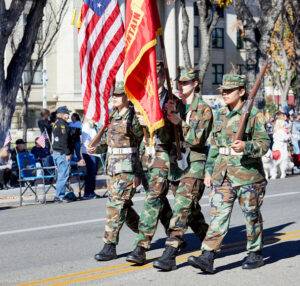 Every service with the exception of Space Force (which relies on installation security services from the Air Force Security Forces) has a variety of law enforcement and criminal investigations specialties. They include both enlisted and officer MOS (Military Occupational Specialties).
Every service with the exception of Space Force (which relies on installation security services from the Air Force Security Forces) has a variety of law enforcement and criminal investigations specialties. They include both enlisted and officer MOS (Military Occupational Specialties).
As with all other officer roles, however, you need a bachelor’s degree just to receive a commission. Enlisted jobs, on the other hand, may have no restrictions to entry, or have some basic ASVAB (Armed Services Vocational Aptitude Battery) requirements.
The Army and Air Force have dedicated commands for their police services, while the Coast Guard, Navy, and Marine Corps assign their police directly to units or installations. Each service also has a civilian police force used to complement military police and provide services primarily at bases and in regular policing contexts.
Army - Military Police Corps
- 31B Military Police/31K Working Dog Handler - 30 weeks of One Station Unit Training combining Basic with police and law enforcement training at Fort Leonard Wood.
- 31D CID Special Agent - Criminal Investigations agent candidates already have to have a bachelor’s degree or accumulate 60 college credits in the service to fill this role as military detectives
- 31K Working Dog Handler - K-9 handler receive an additional 17 weeks of Advanced Individual Training in search and detection and animal care.
Army MP training includes realistic exercise in Stem Village, a mock military base where regular policing and security exercises are practiced with instructors and actors.
Navy
Master at Arms – A 9 week “A” School for Navy shore patrol is co-located at Lackland Air Force Base with the Air Force Security Forces Academy.
Marine Corps
5811 Military Police – 20 weeks at the US Army Military Police School at Fort Leonard Wood with a special Marine Corps Detachment. Other 58 series jobs focus on corrections or investigations with additional specialized training.
Air Force - Security Forces
- 3P Security Forces - 65 days of training at Lackland Air Force Base’s Air Force Security Forces Academy. Working dog handlers receive an additional
- 7S Special Investigations - 19 weeks of training at the Air Force Special Investigations Academy at the Federal Law Enforcement Training Center in Glynco, Georgia.
Air Force Security Forces personnel have one of the most important police jobs in the world: securing and protecting the nation’s nuclear deterrent forces.
Coast Guard
- Maritime Enforcement Specialist - 10 weeks of training at the ME “A” school in Charleston, South Carolina learning both conventional LE skills and special aspects of maritime enforcement and port security.
- Special Agents - USCGIS draws on a variety of active duty personnel from different rating areas.
Unlike civilian police forces, military criminal and counter-intelligence investigations are carried out by separate commands in each service. Military police may be responsible for enforcing and conducting limited investigations, but significant criminal investigations, those involving felonies, are handled by these branches:
- US Army Criminal Investigation Divisions
- Naval Criminal Investigative Service
- Marine Corps Criminal Investigation Division
- Air Force Office of Special Investigations
- Coast Guard Investigative Service
Because they are entirely separate from military police forces, getting into these units is not as simple as being promoted up the ladder, the way that you would go from patrol officer to detective in a civilian force. In many cases, investigators are drawn from both military and civilian personnel. In both cases, you’re likely to need some college before even applying to those specialties.
Law Enforcement Is a Core Mission for the Coast Guard
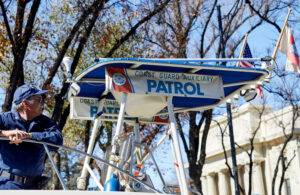 Although every service has military police as a specialty, the Coast Guard has a slightly different approach due to their special hybrid role in national defense.
Although every service has military police as a specialty, the Coast Guard has a slightly different approach due to their special hybrid role in national defense.
In times of peace, the Coast Guard itself is a civilian law enforcement agency. In fact, it is the lead federal agency in all forms of maritime law enforcement. Cutters are responsible for patrolling from than 4 millions square miles of ocean in the Exclusive Economic Zone within 200 miles of shore. They interdict drug runners, fend off foreign fishing vessels, enforce environmental regulations, and secure ports and shipping against terrorist threats.
To accomplish these law enforcement missions, every single commissioned officer, warrant officer, and petty officer in the Coast Guard is given broad authorities of search, seizure, and arrest on the high seas.
But even so, the Guard has dedicated enlisted Maritime Enforcement Specialists as well as Special Agents assigned to the Coast Guard Investigative Service (CGIS).
Military police get the full complement of general police procedure and techniques, but they have additional duties that require additional training, too. Those include:
- Containing and managing prisoners of war
- Warzone traffic control and convoy security
- Counterintelligence security
These skills may not have much use in civilian police jobs, but they sure do give you something interesting to talk about at job interviews.
Military Police Training Intersects with Many Different Issues in Civilian Law Enforcement
One thing you’ll learn about the military after you enlist is that it’s a massive education machine. Every unit wants to train up personnel to the highest standards. That means there are tons of opportunities for specialized training courses to hone your policing skills along the way. Just a sample of the law enforcement courses available from the Army Training Requirements and Resource System catalog gives you an idea:
- Antiterrorism Officer course (Basic and Advanced)
- Domestic Violence Intervention Techniques
- Child Abuse Prevention Investigative Techniques
- Non-Lethal Weapons Instruction
- Advanced Crime Scene Investigative Techniques
- Conventional Physical Security Crime/Prevention
- Protective Services Training
- Special Reaction Team training
It doesn’t take too much imagination to see how valuable some of those skills will be in a civilian police job.
Getting College Credits or Professional Certifications Through Military Police Service
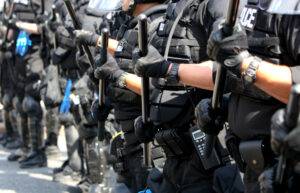
The level of education offered in some of these courses is such that some military-supportive universities will be willing to count your work as credits toward some of their law enforcement courses. You can also use the DANTES (Defense Activity for Non-Traditional Education) system’s CLEP (College Level Examination Program) to test your skills for credits.
You may also be able to take advantage of COOL, the Credentialing Opportunities On-Line program. Offered through DoD, this can grant you up to $4,000 toward classes, tests, or materials needed to achieve common civilian licensing and certificates related to your MOS. With the approval of your chain-of-command, you can earn credentials like:
- Certified Safety Professional
- Certified Protection Professional
- Professional Certified Investigator
- Certified Corrections Manager
Any of these could be beneficial in the civilian law enforcement world.
Build on Your MP Experience to Become a Civilian Law Enforcement Officer With a Degree in Criminal Justice
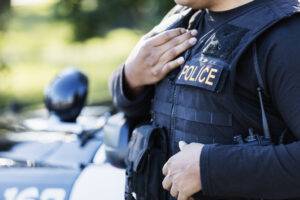
In the not-to-distant past, it wasn’t unusual for just about any military veteran to have a shot at getting a job as a cop after discharge. Most law enforcement agencies hire based on civil service examinations, and many also offer preferential status to veterans.
Although a degree is not typically required for entry-level policing roles, it is sometimes a stated preference. It can also be helpful when moving up through the ranks into investigative and leadership roles as you progress in your career.
The Bureau of Labor Statistics forecasts that policing jobs will grow at about the same rate as the economy overall, seven percent between 2020 and 2030. But it’s a very economically-insulated job. People don’t stop dialing 911 in a recession.
Police Salaries Are Solid and Law Enforcement Jobs Are Generally Secure
For a job you can get directly out of the military, policing comes with a solid salary level.
According to the Bureau of Labor Statistics, the median annual salary for police and detectives was $66,020 in 2021.
Not only that, but many people are surprised to learn that policing can be a six-figure income career. The top ten percent of police and detectives make more than $105,540 per year, according to the BLS.
Of course, all this is very dependent on the agency, role, and region of the country where you are employed. Specific jobs within law enforcement have different median salary levels:
- Detectives and criminal investigators - $83,640
- Transit and railroad police - $64,930
Military police are particularly concerned with traffic management and route security—which could make them a good fit for transit and railroad policing positions in the civilian world.
- Police and sheriff’s patrol officers - $64,610
- Fish and game wardens - $60,730
There’s also a predictable salary ladder when it comes to agency size and job responsibility. The big federal law enforcement agencies are the alpha wolves in policing salaries:
- Federal - $93,970
- State - $72,280
- Local - $64,610
Earning a Degree to Power Your Police Career After Military Service
 More and more jobs in American life are moving toward requiring college degrees. It’s not a bad idea to have a degree on your radar if you are looking to compete for promotions to leadership and investigative jobs. But choosing the right degree level will depend on both your military education benefits and your goals.
More and more jobs in American life are moving toward requiring college degrees. It’s not a bad idea to have a degree on your radar if you are looking to compete for promotions to leadership and investigative jobs. But choosing the right degree level will depend on both your military education benefits and your goals.
Associate Degrees in Criminal Justice
A two-year associate degree is the entry-level college degree for policing. Combining practical training in investigation, legal concepts, and procedure, it also comes with a set of essential liberal arts courses in subjects like math, English, and social studies. These classes build your communication and critical thinking skills. They help turn you into the kind of well-rounded officer that modern police agencies are looking to hire.
Bachelor's Degrees in Criminal Justice
A bachelor’s degree in criminal justice or law enforcement takes four years to earn and goes into much greater depth than associate’s programs. You’ll have more elective options to specialize your training, and also extra depth in the essentials of law and law enforcement. Bachelor’s programs also have a broader set of general studies requirements, a vital part of the education that makes these degrees the foundation for management roles and more advanced studies.
Master's Degrees in Criminal Justice
A master’s degree in criminal justice is truly the next level in law enforcement education. You’ll want one of these two-year degrees when you decide to go for a position with a heavy-hitting federal agency like the FBI, or to ascend to the command ranks of any major urban department. That’s because they go all-in on leadership skills and an in-depth investigation of criminal behavior, law enforcement strategy, and major public policies relating to the justice system.
Doctoral Degrees in Criminal Justice
Doctoral programs take you to the pinnacle of expertise in the law enforcement community. They tend to take two to three years to complete. There are several different options, each oriented at taking your career in a specific direction.
- Doctors of Philosophy in Criminal Justice (PhDs) are primarily academic and research-oriented degrees. They develop your teaching expertise and theoretical work in criminal justice.
- Doctor of Criminal Justice (DCJ) programs offer a more practical education. They offer in-depth focus on current trends and topics in the field to prepare administrators and leaders in law enforcement organizations
- Doctor of Psychology in Criminal Justice (PsyD) degrees also focus on practical matters, but their focus is aimed at the psychology of criminals and crime. Although this work can qualify you for licensure as a psychologist, it also equips leaders in organizations focused on criminal psychology.
- Doctor of Public Administration (DPA) degrees prepare police and public safety leaders to take on major policy, organizational development, and management in the largest agencies operating at the highest levels of planning and strategy.
Degrees Outside Criminal Justice Can Also Power Your Law Enforcement Career
Cops don’t just get degrees in criminal justice. There are a lot of different fields that have a real impact on law enforcement, and can be very useful in boosting your career in the field. These can include:
- Sociology – The first thing any cop learns is that you can’t lock up the whole world. If you want to understand when and what sort of criminal justice approaches are most effective against societal influences on criminality, a degree in sociology gives you those tools.
- Psychology – On an individual level, both corrections and investigative work benefit from a keen insight into the human psyche and behavioral influences.
- Human Services – In much of the United States, law enforcement effectively functions as just another branch of human services work. Dealing with drug addiction, homelessness, and other societal issues all comes easier with majors in human services.
- Criminology – The study of crime and deviant behavior is always useful to police, and that’s the focus of degrees in criminology.
- Public Safety – Policing is just one part of the larger umbrella of public safety work. Degrees in this field are useful to officers hoping to climb the ladder to positions of higher responsibility.
- Law – Working in law enforcement isn’t really legal work. But many police do become fascinated with the law, and may even go on to become lawyers. Pre-law or even a JD degree is a great choice to fulfill those interests.
In fact, most criminal justice degrees include all of these subjects in their curriculum. Majoring in one of those fields instead simply offers a specialization, which can make a lot of sense for particular law enforcement roles.
The Criminal Justice Curriculum Teaches the Civilian Policing Skills You Need
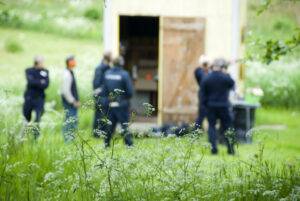 Let’s face it; you basically have all the essential skills for a civilian policing career the minute you leave the service after working in a military MP MOS. A criminal justice degree offers broad preparation for careers in law enforcement, though. That goes beyond just the beat cop or highway patrol jobs; you get an in-depth preparation for the analysis of criminal motives, sociological factors, detection methods, and the legal system that can take you to the ranks of detectives, federal agents, or public safety leadership.
Let’s face it; you basically have all the essential skills for a civilian policing career the minute you leave the service after working in a military MP MOS. A criminal justice degree offers broad preparation for careers in law enforcement, though. That goes beyond just the beat cop or highway patrol jobs; you get an in-depth preparation for the analysis of criminal motives, sociological factors, detection methods, and the legal system that can take you to the ranks of detectives, federal agents, or public safety leadership.Courts and the Law – Policing is just one element of the larger criminal justice system. Understanding the law and the criminal justice process is a key part of effective law enforcement, so classes in the laws and how the court system works are part of all CJ programs.
Criminology and Psychology – Knowing your enemy is something that is just as important in police work as it is in the military. You’ll find that courses in understanding and predicting criminal behavior and criminal psychology are similar to intelligence briefings and assessments, and just as important to effectively doing the job.
Investigations – Good police work means establishing all the facts and building a case systematically and thoroughly. Coursework in investigations takes you through each step in cracking a case. More importantly, it teaches you all the documentation and chain-of-evidence steps required to get a conviction out of it.
Ethics – American policing is going through a crisis right now, no doubt about it. So ethics and professional conduct classes are front and center in modern CJ degrees. You’ll learn about both the societal impacts that unethical policing can have and ways to maintain the right behaviors and actions under pressure.
Criminal Procedure – Above all, police officers must themselves follow the laws. Many regulations apply to police conduct and handling investigations and arrests. Coursework in criminal procedures helps adapt your military law enforcement experience to the different rules and expectations present in civilian society.
Sociology – Cops all understand that crime both shapes and is shaped by the society it occurs within. That’s the subject of sociology. These classes help you understand the larger impacts of crime in civil society and also to understand how criminal classes and socioeconomic influences can drive criminal behavior itself.
Electives and Specializations in Criminal Justice Degrees Alter the Arc of Your Career Path in Law Enforcement
 Because you can have crime in pretty much any aspect of life, there are many different specializations in criminal justice. Most degrees offer a healthy number of options for different electives to help you build your expertise in different areas of interest you may have in law enforcement. These include:
Because you can have crime in pretty much any aspect of life, there are many different specializations in criminal justice. Most degrees offer a healthy number of options for different electives to help you build your expertise in different areas of interest you may have in law enforcement. These include:
- Cybercrime
- Corrections
- Forensic Science
- Community Policing
- Juvenile Justice
- Public Adminsitration
In some cases, you might find a degree program that allows a concentration or minor in one of these areas. In others, you’ll have to put together your own coursework to build your expertise. Either way, these electives can pay off if you are angling for a particular kind of policing job after graduation.
Pinning Down the Right Military-Supportive School for Law Enforcement or Criminal Justice Studies
Deciding to get a degree in criminal justice is the easy part after you leave the service. Picking the right school to earn it at is where it gets tough.
You deserve a first rate education in law enforcement from a university that respects your status as a military veteran.
That starts off with identifying schools that accept GI Bill® benefits. As the single largest educational benefit available to veterans, the GI Bill® is the central consideration in your post-service schooling. Offering full coverage of in-state tuition for up to 36 months, a housing allowance, and a stipend for books and supplies, this is usually all you need for anything up to a bachelor’s in criminal justice.
But that’s just the lowest bar a military-supportive college has to clear. You’ll probably also want to examine what they have to offer in the way of:
- Academic and supportive counseling services for veterans
- On-campus veterans’ organizations
- Credit offered for military service
- Priority enrollment for veterans
Of course, not all vets get full GI Bill® benefits, and not all are satisfied with attending public institutions. So you may also want to look into reduced tuition rates available at some military-supportive schools. And if you are headed for a private or out-of-state college, where GI Bill® benefits are capped, you will also want to check out their Yellow Ribbon program support.
Yellow Ribbon is a partnership between the VA and participating schools. The college defines what programs it wants to include, how many vets it will offer coverage for, and what compensation it is willing to kick in. The VA then matches that amount. In many cases, that’s enough to fully cover any costs over and above the regular GI Bill® rates. And that opens up military-supportive universities that you might not otherwise even dream of being able to attend.
Military Training Contributes More Than Just Skills to Future Law Enforcement Careers
 Your military service will have taught you that you can push harder, and go further than the limits you think you have. You learn to work through the hard parts, keep your head up, and persevere against all odds. You served as part of a team, and you put others ahead of yourself.
Your military service will have taught you that you can push harder, and go further than the limits you think you have. You learn to work through the hard parts, keep your head up, and persevere against all odds. You served as part of a team, and you put others ahead of yourself.
The situational awareness and character you develop as a military police officer will serve you well in your civilian law enforcement career.
With colleges and the Department of Veterans Affairs behind you, you can take those capabilities and can-do attitude and earn a degree that will allow you to compete for leadership roles in criminal justice and law enforcement.
2021 US Bureau of Labor Statistics salary and employment figures for Police and Detectives and Correctional Officers and Bailiffs reflect national data, not school-specific information. Conditions in your area may vary. Data accessed June 2022.






